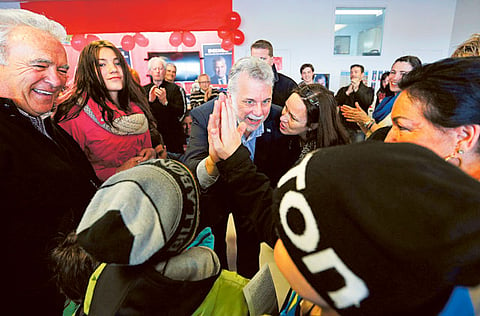Quebec separatist party under threat in election
Revives debate on whether the French-speaking province should break away from Canada

Ottawa: A month ago, Monday’s election in Quebec seemed like such a good idea to the ruling Parti Quebecois, the largest separatist party in the mostly French-speaking Canadian province.
Premier Pauline Marois and her minority government hoped to take advantage of a comfortable lead in the polls to capture a majority of seats in the provincial legislature. That would enable them to push through a provincial charter on secularism and possibly set the stage for a new referendum on whether the province should leave Canada.
But the strategy has backfired and, after a surge in support for the opposition Liberals, the PQ government now risks being kicked out altogether in the provincial election.
The turning point in the campaign came when Marois announced that Pierre Karl Peladeau, the controlling shareholder of the Quebecor Inc media empire, would run as a PQ candidate for one of the seats.
At first Peladeau, or PKP as he is known, was seen as a star who would bring economic gravitas to a party viewed as leaning to the left and influenced by organised labour. When Marois introduced him as a candidate, Peladeau pumped his fist in the air and said he wanted “to make Quebec a country.” For the PQ, it was a rare moment of forthrightness on the sovereignty issue. Even though independence is its raison d’être, the party plays down that option to avoid scaring off voters who want Quebec to stay in Canada. Two earlier referendums on separation, in 1980 and 1995, fell short, and today a solid majority of Quebec voters oppose a third plebiscite on that issue as well as separation itself.
The party’s reticence on the issue now seems well-founded.
Since Peladeau’s declaration, the campaign has been dominated by the question of a referendum. As a consequence, the PQ’s lead evaporated, and it gradually fell further behind the pro-Canada Liberal Party of Quebec.
“Madame Marois took a gamble and lost, on PKP,” commented Antonia Maioni, director of the Institute for the Study of Canada at McGill University in Montreal.
A Leger online poll taken April 2-3, and published in Saturday’s Journal de Montreal, put the Quebec Liberals ahead of the PQ 38 per cent to 29 per cent, which would translate into a PQ defeat if the results held true on Monday.
Pollster Jean-Marc Leger noted, however, that one in four voters said they could still change their mind.
“The Liberal lead is significant in percentage terms, but in terms of number of seats it is much less certain,” he said.
The idea of Canada’s largest and second most-populous province becoming independent, leaving a gap from the Atlantic Provinces to Ontario, stirs emotions on both sides and can leave markets unsettled.
The first vote on separation failed by almost 20 percentage points in 1980 but lost by just over one point in 1995.
J.P. Morgan pointed out in a note to clients that the Canadian dollar lost 4 per cent against the US dollar in the run-up to the 1980 referendum and 3 per cent ahead of the 1995 vote, regaining it all after the No votes.
The Quebec election campaign — also eyed in Scotland, which will vote on secession from the United Kingdom in September — has not had a discernible effect on the Canadian currency. But investors are demanding more of a premium to hold Quebec bonds due to lingering concern about how viable an independent Quebec would be.
The yield for Quebec 10-year bonds was 15 basis points higher than similar Ontario bonds on March 4, and the spread rose to 16 basis points the next day when the election was called. It peaked at 18 basis points three days after Peladeau’s appearance, before settling down to 11 basis points as the polls turned against the separatists.
Though the polls point to a Parti Quebecois defeat, Quebec voters are notoriously fickle, and the polls got the recent provincial elections in Alberta and British Columbia completely wrong. That said, a PQ majority is highly unlikely at this point, and if the PQ returned with only a minority government, it would not be able to launch a referendum due to opposition from the other parties.
Secularism charter
A second prominent theme of the campaign was the Parti Quebecois plan for a secularism charter, which would ban public sector workers from wearing conspicuous religious symbols, from the Muslim hijab to the Jewish kippa to large Christian crosses.
It introduced the charter in legislation that did not pass before the election. The charter has proved popular with francophones, many of whom are concerned about the loss of their identity.
The party has sent mixed messages on whether employees would lose their jobs because of the dress code — first saying no, but then conceding that it might be possible. And in any case concern over the referendum overshadowed all else.
Pressed repeatedly in the debates and in news conferences, Marois said there would be no referendum, pausing before adding, “as long as Quebeckers are not ready” — something Liberal leader Philippe Couillard pounced on to strengthen his claim to be the leader needed to keep Quebec in Canada.
“In the end, the PQ spent the campaign consolidating the vote of its main rival while weakening its own,” veteran pundit Chantal Hebert wrote in a blog for the magazine L’Actualite.
Polls close at 8pm EDT (2400 GMT) on Monday and results should start trickling in within the hour.



